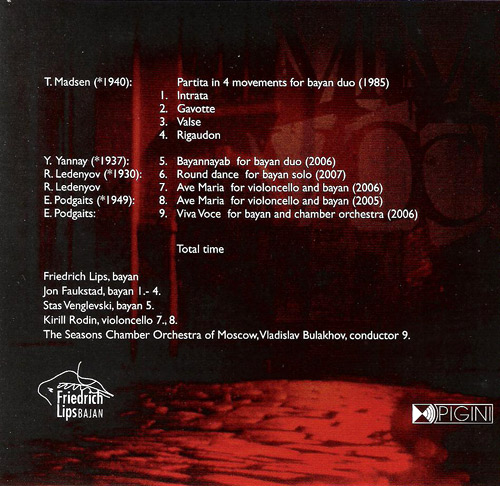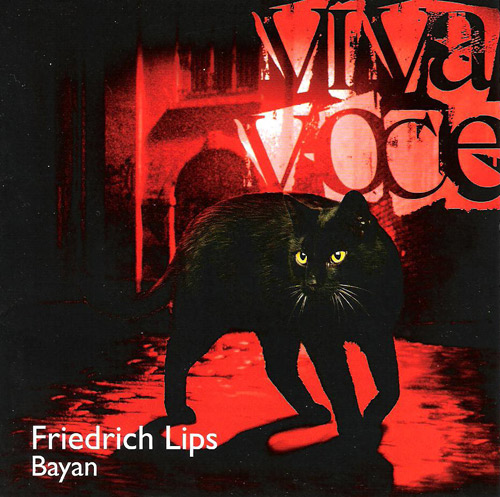Viva VoceIf one hears the term “viva voce” he may think of the oral examination faced by a student in defending a thesis or dissertation. Or one might think of the “spoken evidence” presented in a law process. Indeed, one might even think of “long live the voice” of a person or a particular work. It is aptly used as the title of this newest CD by Friedrich Lips, the world renowned Russian bayanist who is once again providing the music world with new compositions for the bayan, used in one form or another. We could say that Lips is giving voice to music worthy of a long life and be absolutely correct.The six compositions on this CD are performed as bayan duets, bayan solo, bayan with violoncello, and bayan with chamber orchestra; all are relatively new with the oldest from 1985 and the latest from 2007. Each piece offers something for the listener to admire or, at least, to wonder about, often to the extent of making us want to hear more by a particular composer. Partita (in four movements) for Bayan Duo (1985) written by Norwegian Trygve Madsen (b. 1940), features Friedrich Lips and Jon Faukstad (Norway) as duet partners. It is particularly useful as an opening selection on a concert because of its form with 1) Intrata, 2) Gavotte, 3) Valse, and 4) Rigaudon. To my ears, the Rigaudon was the most exciting with both players being very busy throughout and even because of the unusual middle section which eventually took us back to earlier motifs in the piece. The balance of the players was very well captured, too, which is not always the case with such duets. The composer has many compositions to his credit with the 24 Preludes and Fugues for Piano being one of his most popular, perhaps. He has written for many different instruments, including a Concertino for Trumpet, Op. 118, and a Concertino for Euphonium, Op. 123, and many of his compositions have been included in a number of syllabi around the world. It is important, of course, for the bayan to have this Partita for Bayan Duo included among his list of works. Bayannayab, written by American/Israeli composer Yehuda Yannay (b. 1937 in Romania) is performed by Lips and his former student Stanislav Venglevski, now living in the USA. One of the things I found most interesting in listening to this composition was the demand for a crucial response of the low reeds of the bayan, especially during the opening measures. Yannay is a successful international composer, now retired, and he must have a great sense of humor, too, because of the naming of this particular work. You will notice the word bayan, morphing into his name yannay, and then bayan spelled backwards in the title. The work is based on four chords that are broken down gradually and then overlap each other. The next piece on the CD is a beautiful bayan solo, Round Dance, by Roman Ledenyov (b. 1930) written in 2007 and performed by Friedrich Lips. It is the third part of a cycle under the general title “On the background of the Russian landscape.” It is one which makes one desire to hear more of the composer’s music. And, lucky for the listener, the following piece indeed offers another opportunity to do so. While there have been and will continue to be numerous compositions based on the Ave Maria or the image of the Virgin Mary, there are two outstanding ones on this CD. The first is another of Roman Ledenyov’s compositions, Ave Maria for Violoncello and Bayan (2006). This is an example of the perfect partnership of the cello and the bayan! It is absolutely exquisite in every detail. Regardless of the register, upper or lower, there is a sensual, sensitive and touching character shown throughout by both musicians. There is a lesson to be heard by listening closely to the repeated sostenuto chords on the bayan. And then, almost imperceptibly, the instrument is heard in an extremely soft counter-melody to the cello. This performance shows how musicians always hope to play together. The second is Ave Maria for Violoncello and Bayan (2005) by Efram Podgaits (b. 1949). Podgaits is certainly one of the most important composers who have written for Friedrich Lips and the bayan. This piece again features Friedrich Lips on bayan and the very well-known violoncellist, Kyrill Rodin, who has so often worked together with Lips. There are instances where the listener will believe there are two celli rather than one; it is simply a superb performance, as is, of course, that of Friedrich Lips. It is another of the most outstanding pieces on this particular recording. It is dedicated to Lips and Vladimir Toncha. Efram Podgaits has composed well over 200 works in different genres. His music has been performed regularly at music festivals in many different countries. Many of his works are now compulsory pieces in the programs of major international competitions and the world-famous Bolshoi Theatre has staged his ballet Moydodir. Lips premiered his Concerto for Bayan, Op. 165, in 2002, the same year Podgaits was named composer of the year by the Russian monthly The Musical Review. Viva Voce for Bayan and Chamber Orchestra (2006) is also by Efram Podgaits and now the listener knows why the CD was named after this composition; it is undoubtedly the most interesting composition on the recording. It is absolutely one for which we must give our thanks for its inclusion in the bayan/accordion repertoire! It provides rhythmic patterns from the very opening statements which will captivate the listener throughout the piece. There is a perfectly balanced sound of orchestra and bayan. The delicate play of bellows action in answer to the sparkling quick motifs given by the orchestra, or in reverse, will show once again the importance of perfect bellows control as opposed to indiscriminate “shaking” so often used by some accordionists. The interesting use of smashed clusters, without a hint of brash ugliness, as well as the very short, soft use of the momentary glissandi, shows again how delicate the playfulness between bayan and orchestral instruments can be. There is always something to learn in listening to Friedrich Lips! Once more, listen to the importance of the tasteful accents and the quick bellows actions in response to the orchestra. And while the use of the vibrato on the instrument sometimes becomes overblown by some, it is not on this performance! It is shown, along with an attack and release of sound which will cause seasoned musicians to listen with admiration. Even the bending of the reed, which has become so redundant in some compositions, is used with restraint and dignity rarely employed; it is used, not as a gimmick but as a useful musical contribution. The piece builds to an impressive conclusion, after offering example upon example of how the bayan can be both a significant solo instrument and then immediately become an important component of the total orchestral sound. The listener can do nothing but give thanks out loud for this composition and for the musicians who so skillfully performed it. The Seasons Chamber Orchestra of Moscow is conducted by Vladislav Bulakhov. The work of Friedrich Lips is once again impressive. Yes, indeed. VIVA VOCE! This Lips CD # 022 is titled VIVA VOCE. Reviewed by Joan Cochran Sommers on November 15, 2010. The CD VIVA VOCE is available online at MusicForAccordion.com among other distributors. Click the link VIVA VOCE to listen to sound samples. |
||||||||||||||

